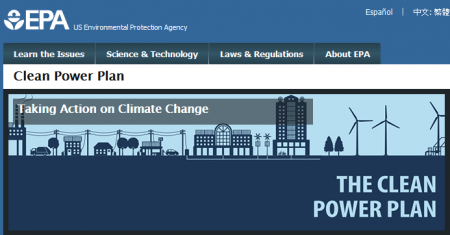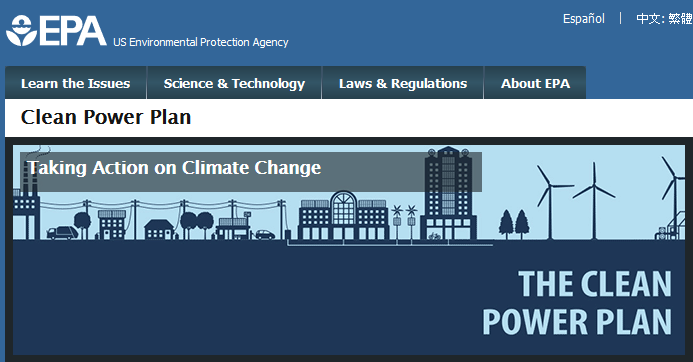CLEAN POWER PLAN ALL PAIN, NO GAIN, FOR THE U.S.
by Tom Harris, Executive Director, ICSC, ©2016
 (Sep. 23, 2016) — On Tuesday, the U.S. Court of Appeals for the District of Columbia Circuit will hear arguments in the litigation over President Barack Obama’s Clean Power Plan (CPP). If implemented, the Environmental Protection Agency’s (EPA) regulation will require states to develop and bring into force plans to reduce carbon dioxide (CO2) emissions from existing power plants.
(Sep. 23, 2016) — On Tuesday, the U.S. Court of Appeals for the District of Columbia Circuit will hear arguments in the litigation over President Barack Obama’s Clean Power Plan (CPP). If implemented, the Environmental Protection Agency’s (EPA) regulation will require states to develop and bring into force plans to reduce carbon dioxide (CO2) emissions from existing power plants.
The focus for opponents of the CPP will be its questionable legality. However, the nine judges hearing the case should also keep in mind that the rules are pointless. The CPP will have no measurable impact on climate.
EPA Administrator Gina McCarthy has repeatedly admitted this before Congressional hearings. She maintains that the CPP is still worthwhile because, to quote from her September 18, 2013 testimony before the House Subcommittee on Energy and Power, it “is part of an overall strategy that is positioning the U.S. for leadership in an international discussion, because climate change requires a global effort.”
Setting a good example would make sense if it were known that a man-made climate crisis was imminent and developing nations, the source of most of the world’s emissions, were likely to follow our lead.
But developing countries have indicated that they have no intention of following us. They will not limit their development for ‘climate protection’ purposes.
For example, on July 18, President Rodrigo Duterte of the Philippines said about the Paris climate agreement, “You are trying to stymie [our growth] with an agreement… That’s stupid. I will not honor that.”
Duterte can say this with a clear conscience. The United Framework Convention on Climate Change, the foundation of the Paris Agreement, gives an out clause for developing nations. Article 4 of the treaty states, “Economic and social development and poverty eradication are the first and overriding priorities of the developing country Parties.”
Actions to significantly reduce CO2 emissions would entail dramatically cutting back on the use of coal, the source of 81% of China’s electricity, 71% of India’s, and 29% of that of the Philippines. As coal is by far the least expensive source of electric power in most of the world, reducing CO2 emissions by restricting coal use would unquestionably interfere with development priorities. So developing countries simply won’t do it.
From a climate change perspective, it probably won’t matter. Temperature variations, extreme weather and sea level rise all fall within that expected due to natural variability over the past century. This despite a 10% rise in CO2 concentrations in the atmosphere. So the primary rationale for actions to restrict emissions is merely the possibility of dangerous climate change in the future.
Obama summed up this concern in his September 20 speech to the UN General Assembly, saying, “If we don’t act boldly [to restrict emissions], the bill that could come due will be mass migrations, and cities submerged and nations displaced, and food supplies decimated, and conflicts born of despair.”
Obama’s forecasts are based on computer models of future climate states, simulations that have failed miserably in the real world. In fact, the science is so immature that it is not currently possible to build climate models that generate meaningful climate predictions. University of Western Ontario applied mathematician Dr. Chris Essex, an expert in the mathematical models that are the basis of climate change concerns, explains,
“Climate is one of the most challenging open problems in modern science. Some knowledgeable scientists believe that the climate problem can never be solved.”
Even the United Nations Intergovernmental Panel on Climate Change (IPCC) said in its Third Assessment Report,
“The climate system is a coupled non-linear chaotic system, and therefore the long-term prediction of future climate states is not possible.”
The judges hearing the CPP case must understand that the Clean Power Plan is irrational. We do not know what climate will do over the next century, even whether it will warm or cool. And we have no chance of controlling it, no matter how drastically we cut our emissions. Developing countries will not follow our lead on emissions reductions anyways. Regardless of the legal issues involved, Obama’s signature climate plan is all pain, no gain for America.
_____________________________________________________
Tom Harris is Executive Director of the Ottawa, Canada-based International Climate Science Coalition.


Dave James, the commenter, seems to be an enviro activist who follows me around the Web posting the same, or similar comments over and over, even after I have shown them to be either false or misleading. He appears to assume readers at each site will not generally know I have already handled the attacks and so he makes them over and over even though he must know by now that they are wrong or misleading.
I think he does this because it takes my time to respond each time, thereby taking time away from my other writings and, as I imply above, he seems to feel readers will not know of my previous corrections and clarifications.
That said, I will answer him properly as soon as I have time, probably later this weekend.
Tom Harris purpose is not scientific but political. Last month Mr. Harris endorsed Donald “climate change is a hoax” Trump. Mr. Harris demanded people follow Donald Trump’s lead on climate change. http://williamsondailynews.com/opinion/columns/6302/gop-must-follow-trumps-lead-on-climate-change
Mr. Harris is not credible concerning climate science.
Tom Harris’s expert used to refute climate science of NASA, the National Academy of Sciences and the IPCC is Dr. Chris Essex. Dr. Essex is famous for a June 2007 column in the National Post (Canada), Essex wrote, “There is no such thing as global temperature. And if there is no global temperature, how can there be global warming?”
Tom Harris parrots the same false argument made by Lord Monckton in 07/19/2011 in a debate with Richard Dennis. Mr. Harris’s argument that is based on quote-mining the 2001 IPCC Third Assessment Report and taking a single sentence out of context – the first sentence in the quote below. The context of the quote is provided in the following sentences:
“The climate system is a coupled non-linear chaotic system, and therefore the long-term prediction of future climate states is not possible. Rather the focus must be upon the prediction of the probability distribution of the system’s future possible states by the generation of ensembles of model solutions. Addressing adequately the statistical nature of climate is computationally intensive and requires the application of new methods of model diagnosis, but such statistical information is essential.”
In short, the IPCC is saying that we cannot precisely predict the future climate state; however, we can produce a probability distribution of possible future climate states, which is precisely what the IPCC report proceeds to do.
Like Monckton, Mr. Harris has misrepresented the IPCC report by selecting a single sentence that serves a convenient purpose out of context, and choosing to ignore the text immediately following, not to mention essentially entire sections of the IPCC report where they do indeed detail the probabilities of future climate states from model ensembles.
Four days ago Tom Harris was asked, “Why is a Canadian like you so involved in U.S. Presidential politics, Tom Harris?’ Mr. Harris replied, “Because Canada follows the US on climate change and many issues. Today Mr. Harris claims no one will follow America on climate change. ”
Mr. Harris example of “a leader with clear conscience” is President Rodrigo Duterte of the Philippines. This is the guy who called the US Ambassador to the Philippines a homosexual slur. He threatened to leave the United Nations and form a separate organization with China and African nations because he was criticized for his support of extra-judicial killings of alleged criminals.